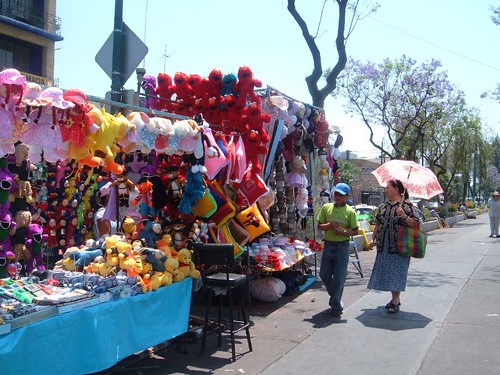The Rule of Law

Professor Becker and Judge Posner are discussing the impact of crime epidemics on Latin American economies on their blog. Both primarily focus their discussion on the rise of rampant criminal activity plaguing Mexico City, but draw conclusions implicating a wider range of developing economies.
The discussion hits on an issue much broader than criminal activity, that is, one of general lawlessness. The two concepts are quite distinct - the former concerned with commission of acts, the latter with the government's inability/wariness of establishing and enforcing a fair, sensible, and enforceable legal code.
Prof. Becker and Judge Posner anecdotally describe how the many sidewalk vendors in Mexico City lose business because of decreased foot traffic - a result of likelihood that well-heeled pedestrians are likely to be robbed or kidnapped. This obviously deprives the vendor of those customers with the most expendable cash (i.e., those that can afford a private driver), working unique harms against those who can least afford to suffer them.
However, as eloquently and expertly described Hernando de Soto in The Mystery of Capital: Why Capitalism Triumphs in the West and Fails Everywhere Else, lost foot traffic is not the only business malady confronting sidewalk vendors around the world, many of which operate in what de Soto refers to as the "extra-legal" realm. These micro-entrepreneurs pay significant sums of money for bribes, "protection," and an impaired (if not eliminated) ability to attract credit. De Soto goes to lengths to show that if given a reasonable opportunity to legally incorporate (rather than the multi-year process, wrought with time consuming bureaucracies, and registration fees), these small business owners do so in droves.
Implementation of the rule of law in the capture, prosecution, and ultimate deterrence of criminal acts is but one half of the equation to remedying the myriad problems facing the residents of (and visitors to) developing countries. Prof. Becker noted, inter alia, the interrelatedness of economic opportunity and criminal activity - and until the basic provision of a fair, sensible, and enforceable legal code can be implemented, it is difficult to imagine an effective remedy to stymie systemic criminal activity.









4 Comments:
Some family friends of mine now live in Houston for most of the year even though they are Mexicans, work and have a home in Mexico City, choosing instead to fly in and out when business requires, often in the same day. They simply tire of the fear and extra hassle of travelling with security throughout the city. They're fortunate enough to have the financial resources to choose to do this. Their kids all live and work in the US now. One of the costs I didn't notice in any of the discussions is that of opportunity cost. For many wealthy Mexicans, living in Mexico is now a forgone alternative.
Fairly common, really- I know lots of Venezuelans in the same boat, and some Nigerians.
Indeed, the same could be said about certain parts of West Baltimore, East L.A., North Philly, etc. While these American cities are still thankfully far from the reality of Port-au-Prince, Cairo, or the favelas of Rio de Janeiro, the outcomes are functionally (but not exactly) the same.
Judge Posner argues that reducing income inequality is likely not the solution to the growing crime wave, and that "[i]t is a fallacy to think that the only sound solutions to social problems are those that remove the underlying causes of the problems." Consquently, he argues that reforms in the police department may be most effective means of mitigating the crime epidemic.
Without implementing - in most cases, revising - a sensible and fair legal code, the forgone opportunity costs will continue to plague these developing economies. Thus, while Judge Posner's emphasis on the cost-effectiveness of police reform may stem the rising tide of criminal activity in the short-term, it will ultimately fail to provide long term growth, stable economies, and an invaluable sense of safety. Citizens must not only feel safe in the streets, but businesses (from the multinational to the sidewalk vendor) must operate in an environment where businesses can provide services without the onus of paying bribes, bureaucratic quagmires, and impaired credit.
Not to minimize the importance of reducing all poverty, but if you reduce the poverty and increase the effectiveness of police and bureaucrats, doesn't that give businesses the stability they need? It seems like those steps would, if anything, be more effective in helping businesses than the average citizen.
Post a Comment
<< Home